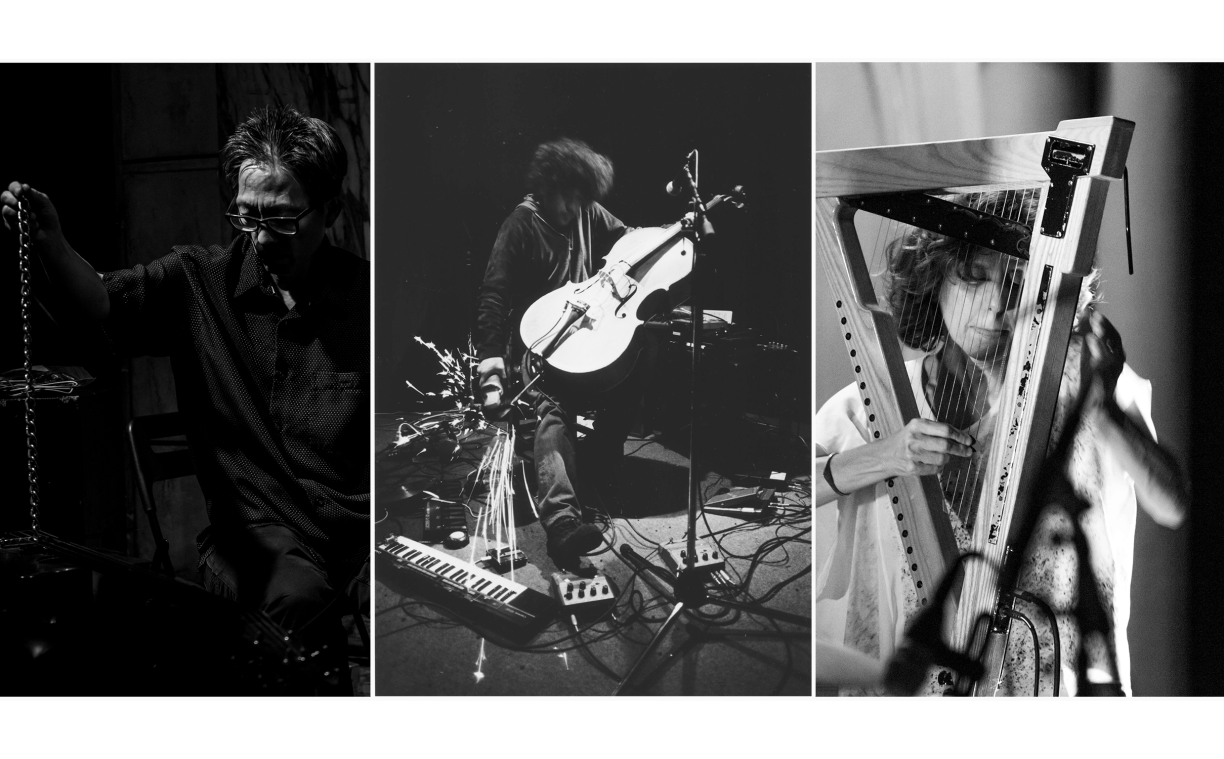Friday, February 2nd at 8pm, ISSUE and AvanTokyo are pleased to present the solo US debut of Japanese cellist Hiromichi Sakamoto. The evening will also feature a duo presentation from musicians Kato Hideki & Zeena Parkins, which will take place at Brooklyn Music School in Fort Greene, Brooklyn.
Hiromichi Sakamoto is a force to contend with. Aside from his mastery of “traditional” cello techniques, Sakamoto is likely, at a moment’s notice, to turn his instrument upside down, sideways, and any way you could imagine (as well as some you couldn’t). He might scrape it with an electric grinder to produce an explosion of sparks, lay it on the floor and drop pencils on it, slap it, and generally do just about anything physically short of setting it on fire. Sometimes called “the cello shamanist,” Sakamoto’s performance will unfold with a mixture of original music and improvisation that he says will “transcend axes of space, time, and borders to evoke a sense of ‘nostalgia that all humans hold.” Tender themes will give way to a gruesome chaos as he pushes his instrument beyond its limits. Sakamoto’s continually evolving practice will see him expand on the vocabulary of the cello to produce a series of sounds–and sights–that one would be hard pressed to believe come from a cello. Sparks may even fly.
Drawing audiences into a similar musical terrain, Kato Hideki & Zeena Parkins will premiere their new composition Into the Periphery, where they expose displacement and the blurred lines between what we hear and what we think we hear. Using a wide range of sounds–foley, mundane objects, synthesis and string instruments–they create an interplay between materials and awareness as they toggle between the touch/sound of objects and the manipulation of sounds mediated through microphones and electronic processes. Their collaboration began in 1994 when Kato joined Parkins’ band No Safety’s for their European tour. Parkins later recorded for Kato’s album “Hope & Despair” in 1995. In 2010, they performed at the Whitney Museum of American Art as a part of Christian Marclay: Festival.
Coming to wider acclaim with his 1999 solo CD Zero-shiki, Hiromichi Sakamoto has devoted his practice to expanding the possibilities of the cello with an uncompromisingly experimental approach to the instrument. Meanwhile, Sakamoto’s diverse compositions for stage inform his theatrical approach to performances. He has composed scores for numerous stage, film, and underground contemporary dance performances, including a 20-year relationship with Taiwan’s innovative Assignment Theater. Sakamoto was also featured in the pioneering music documentary about Japan’s noise music scene, We Don’t Care About Music Anyway (directed by Cedric Dupil and Gaspard Quentz). The cellist is a member of acclaimed toy-pop orchestra Pascals, and, along with voice artist Koichi Makigami and bassist Kiyoto Fujiwara, a producer of the festival Jazz Art SENGAWA, a lynchpin for Japan’s avant-garde music community that takes place each fall on Tokyo’s outskirts.
Kato Hideki is a Japanese-born bassist, multi-instrumentalist, composer, producer and educator. His work is truly diverse, with a wide range of forms, subjects and sounds from experimental, ambient, improvisation, soundtrack and sound design. His work includes three albums with Death Ambient (with Ikue Mori and Fred Frith) on Tzadik Records; the solo bass work “Turbulent Zone” using a prime number tuning system; the photography- inspired “Hope & Despair” on Joyful Noise Recordings; and “Tremolo of Joy” based on magical realism. His collaborations include the soundtrack for a documentary film, “The Journey of Monalisa (El viaje de Monalisa)” directed by Nicole Costa; music and sound design for TAKE Dance, Dallas Black Dance Theatre and Ballet X; and performances for Christian Marclay: Festival at Whitney Museum of American Art. As a producer, he has worked with Eszter Balint, Chris Cochrane, James Fei, Karen Mantler and Stew. An album, “THE WALK” (a collaboration with Kramer) will be released on Shimmy-Disc in fall 2024. Kato teaches at NYU Tandon School of Engineering / Integrated Media & Design. www.katohideki.com
Electro-acoustic composer/improviser, educator, Zeena Parkins is a pioneer of contemporary harp practices. Using expanded techniques, object preparations, and electronic processing she has redefined the instrument’s capacities. Concurrently, Parkins self-designed a series of one-of-a-kind electric instruments. She leans into the harp’s physical limitations pushing its boundaries and impossibilities. In her compositions, Parkins utilizes collections, historic proximities, tactility, spatial configurations and movement. Sonic presence and personality is revealed in explorations of timbral shifts, feedback, gestural configurations, and perceptual residues. Parkins has been awarded three Bessies: NY Dance and Performance Awards, for her groundbreaking work with dance. She has been devoted to her ongoing investigation and collaborative work with dance since the mid-80’s in NYC. Recent collaborations include: a dance film by Eleanor Bauer, NORA the Many (2022) a 2-part program which included a durational installation and a theatrical performance, premiered at the Walker Art Center (2022) with choreographer/dancer, Heather Kravas and visual artist Victoria Haven, Solid Objects/VOIDS, and Neil Greenberg’s Besty, which premiered at La Mama last fall. Last summer Parkins released her long-term project LACE on Chaikin, to critical acclaim. Parkins taught at Mills College from 2011 and until May/2023, when Mills was abruptly purchased by Northeastern University. She held the endowed chair, Darius Milhaud Professor of Composition, in the Music Department.



